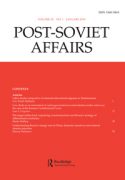In this article, published in Post-Soviet Affairs in 2018, my colleague Tatyana Malyarenko and I argue that the crisis in Ukraine since late 2013 has seen four successive internationally mediated agreements that have been at best partially implemented. Drawing on extensive fieldwork and 42 key informant interviews on all sides, we explain this outcome with reference to the logic of competitive influence-seeking. Given that Russia is currently unable to secure a regime in Kyiv that is friendly and stable, the Kremlin has been hedging against the consolidation of an unfriendly and stable, Western-supported regime in Kyiv by maintaining its control over parts of eastern Ukraine and solidifying the dependence of local regimes there on Russian support. This gives Russia the opportunity to either maintain the current status quo or settle for favourable re-integration terms through which Russia can sustain long-term influence over Ukraine’s domestic and foreign policy orientation. We conclude by offering three broader perspectives on the consequences of competitive influence-seeking in the post-Soviet space: the likely persistence of low-intensity conflict in Ukraine; the further consolidation of territorial divisions in other post-Soviet conflicts; and the need for policy-makers in Russia and the West to prioritize the management of the consequent instability in their contested neighbourhood.
The texts of the four agreements we analyse, including, where available, their Russian versions can be accessed here:
- Agreement on the Settlement of Crisis in Ukraine (21 February 2014)
- Joint Statement on Ukraine released by the US, EU, Ukraine and Russia (17 April 17 2014)
- Protocol on the results of consultations of the Trilateral Contact Group (Minsk I Agreement, 5 September 2014)
- Memorandum with respect to the performance of the provisions of the Protocol of the results of consultations of the Trilateral Contact Group (Minsk I Agreement Supplement, 19 September 2014)
- Package of Measures for the Implementation of the Minsk Agreements (Minsk II Agreement, 11 February 2015)
This article is an open-access publication.

